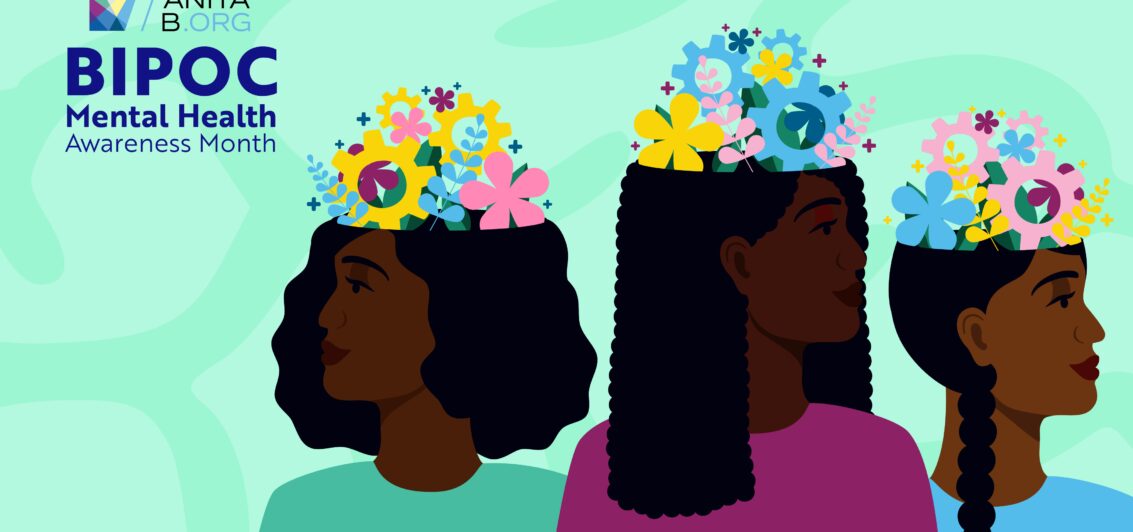In July, we are reminded of and celebrate BIPOC Mental Health Month, an increasingly important matter for our community. AnitaB.org is working to help build communities and influence companies to create work environments that foster a psychologically safe place, create a culture of flexible work, and regularly measure and address feelings of burnout in the workplace. Find helpful and inspiring resources for and from BIPOC individuals below.
Data on BIPOC Women and Non-Binary People.
Data collected via TechEES Report 2021
- Latinx Black women and non-binary technologists had the highest experiences of imposter phenomenon score (3.72) compared to Asian (3.5), Latinx (3.7), and white (3.3), and Black (3.2) women and non-binary technologists.
- AnitaB.org’s recommendations for companies to address the imposter phenomenon:
-
- Focus on making the workplace a safe place to take risks and make mistakes, increasing psychological safety.
-
- Teach managers about growth mindset and how not to reinforce perfectionism.
- Women and Non-Binary technologists who are Black had the lowest feelings of psychological safety in taking risks on their teams (44.7%) compared to Asian (53.6%), Latinx (71.4%), and White (75.6%) women and non-binary technologists.
- AnitaB.org’s recommendations for companies to address psychological safety:
-
- Regularly measure psychological safety at the team level and incentivize good scores for managers.
- Women and Non-Binary technologists who are Black had the lowest sense of belonging (46.3%) compared to Asian (56.6%), Latinx (62.9%), and White (73.5%) women and non-binary technologists.
- 64% of BLNP women and non-binary technologists felt overwhelmed at work and 73.8% felt nervous or stressed often or very often at work.
- AnitaB.org’s recommendations for companies to support women and non-binary technologists that are dealing with stress:
-
- Foster a psychologically safe place.
- Create a culture of flexible work.
- Regularly measure feelings of burnout in the workplace.
BIPOC Mental Health Social Media Accounts
Accounts to follow on Instagram
- The Asian Mental Health Project: @AsianMentalHealthProject
Aims to educate and empower Asian communities seeking mental healthcare.
- Dive in Well: @DiveInWell
Creating space, community, conversations and change for diversity in wellness by providing tools to empower both individuals and businesses in the form of digital workbooks, workshops, consulting, and corporate training.
- Inclusive Therapists: @InclusiveTherapists
A group dedicated to being inclusive of all identities. They periodically offer funds to support free mental health care for BIPOC
- National Queer & Trans Therapists of Color Network: @NQTTCN
A healing justice organization that actively works to transform mental health for QTPOC (Queer and/or Transgender people of color).
- Sad Girls Club: @SadGirlsClub
A nonprofit 501(c)(3) organization committed to destigmatizing mental wellness for millennial and Gen Z womxn, girls, and femmes of color.
- The Nap Ministry: @TheNapMinistry
Explores and promotes the healing power of napping for BIPOC communities – with a focus on Black people – whose rest is challenged by the ever-present trauma in their lives.
- White Bison: @WhiteBison_100
A Native American owned and operated non-profit dedicated to creating a grassroots Wellbriety Movement, with a focus on wellness, sobriety, addiction prevention, and recovery services.
Read more posts from the thread The Journey of Launching Motivity Care, a HealthTech SAAS Start-up, With Karina Muller

